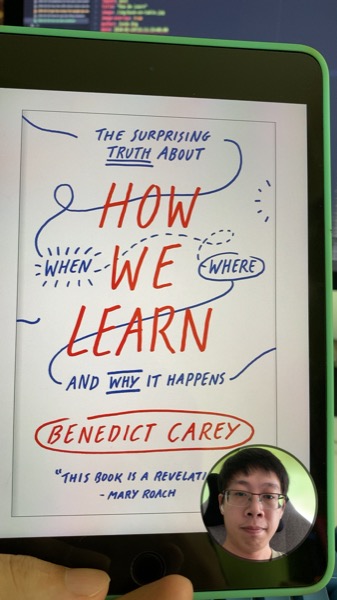We are always learning. But seldom do we stop to think what is the most efficient way to learn? This book has some good tips.
 How we learn by Benedict Carey
How we learn by Benedict Carey
Spacing out study time
This is a proven technique. Space out your study time, and you will retain memory far longer.
Spaced Repetition System (SRS) using app, or flashcards and boxes, will be very very useful.
Fluency Illusion
Q: Why do people bomb a test?
Psychologist says it is the illusion that you remember something just because you repeat it, highlight it, study it long enough, etc.. Those are passive learning and it does not help.
Then what helps? Read next.
Testing is learning
A test is not only a measurement tool, it alters what we remember and changes how we subsequently organize that knowledge in our minds.
Testing is active learning. It is the quickest way to memorize.
A quick rule of how you should use your time: spend 1/3 of the time learning, then 2/3 of the time in self-testing.
I find testing to be the MOST IMPORTANT concept in the book. If you have not, you should integrate self-testing into your learning workflow.
Testing is studying, of a different and powerful kind.
Upside in distraction; aka taking a break..
It is okay to surf YouTube & Facebook, or gossip in the pantry, during working hours.
There are 2 mental operations during breaks:
- Picking up clues from the environment
- Breaking fixed assumptions
They are helpful in solving road blocks (but not speed bumps.. if you play your video games too early, it does not help).
Mix it up
Q: Why are mathematics word problems the hardest?
Because students don’t know which procedure or concept to apply. If a homework has “Quadratic Formula” at the top of the page, then you will apply it without needing to think if it is the right strategy.
To improve, students need to mix different types of problems (requiring different strategies), and therefore they are forced to actively think “what is the right strategy to apply here”.
If you want to improve your free throw, you would think you should just repeat throwing on the free throw line. But scientific experiments have shown that the more effective way is to throw at other places too.
Forgetting is necessary
Our brain is a spam filter of needless information.
Forget, then retrieve, is an exercise for the brain muscle.
To absorb a new language, we must hold off the corresponding words in our native tongue.
- Storage strength
- Retrieval strength - without reinforcement, drops quickly
Effect of contexts
To learn effectively, you need contexts. For example in learning new languages, start with words that you can use immediately.
Sleeping
2 ways to look at the maladaptive:
- A mistake to spend so much time sleeping
- A mistake to spend so much time awake (unnecessary wakefulness)
Sleep’s primary purpose is memory consolidation. Learning. The brain makes subtle connections – new ways to solve tricky math problem, or play difficult sequence of notes.